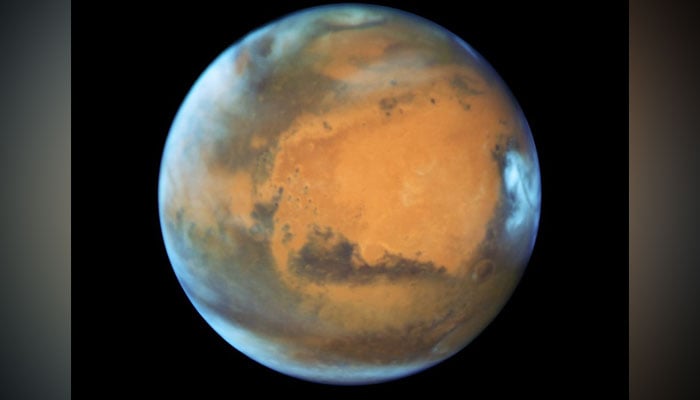Device to prove liquid water can form on Red Planet to ride Japanese Mars mission
Device will contain salts that are believed to exist on Mars and observe how the absorption is done to form water
June 04, 2023

Experts have developed a new device which could prove that water can form on Mars and to prove the theory the new device will be flown to the red planet to probe the process of water formation.
The device was made by experts from the University of Aberdeen, and intended to observe a process which forms water but was never witnessed.
The device was planned to be sent to Mars during a space mission by the European Space Agency (ESA) and its Russian counterpart, but the launch could not materialise due to a Russia-Ukraine war.
The device will now be attached to an upcoming Japanese mission to Mars set to fly in the next five to ten years.
Scientists maintain that unique salts on the surface absorb water from the atmosphere and produce liquid water in the form of brine at night when the temperature is lowest.
This process will be recorded by a device named Habit (Habitability: Brine Irradiation and Temperature).
The device will contain salts that are believed to exist on Mars and observe how the absorption is done to form water.
It will also be investigating the amount of water vapour in the atmosphere, daily and seasonal variations in ground and air temperatures, and the UV radiation environment.
The Habit is set to be presented before UK Space Agency representatives at the Japanese Aerospace Exploration Agency headquarters in Tokyo this month by Professor Javier Martin-Torres, head of the Department of Planetary Sciences, where he will also brief the international Symposium on Space Technology and Science.
He said: “We are very grateful and excited to have this new opportunity to get Habit to Mars through the UK Space Agency and the Japanese space programme.
“Although we will need to do some small adaptations to ensure Habit is suitable to be compatible with the Japanese equipment, this work is minor compared to the years of research and development that have already been done on the device to get us to this stage.”
“I previously had the opportunity to work on a different instrument, the Rover Environmental Monitoring Station (REMS), which is currently on Nasa’s Curiosity rover.”
“It’s a nice feeling to see the pictures of REMS on Mars and to be able to say that I once had that device in my hands.”
“Assuming the mission goes ahead as planned, Habit will become the first-ever European in-situ resource utilisation instrument to be deployed on the surface of another planet.”
“We are very fortunate and excited to have this opportunity, but more excited by the possibility of answering some age-old questions about the existence of water and life on Mars.”











